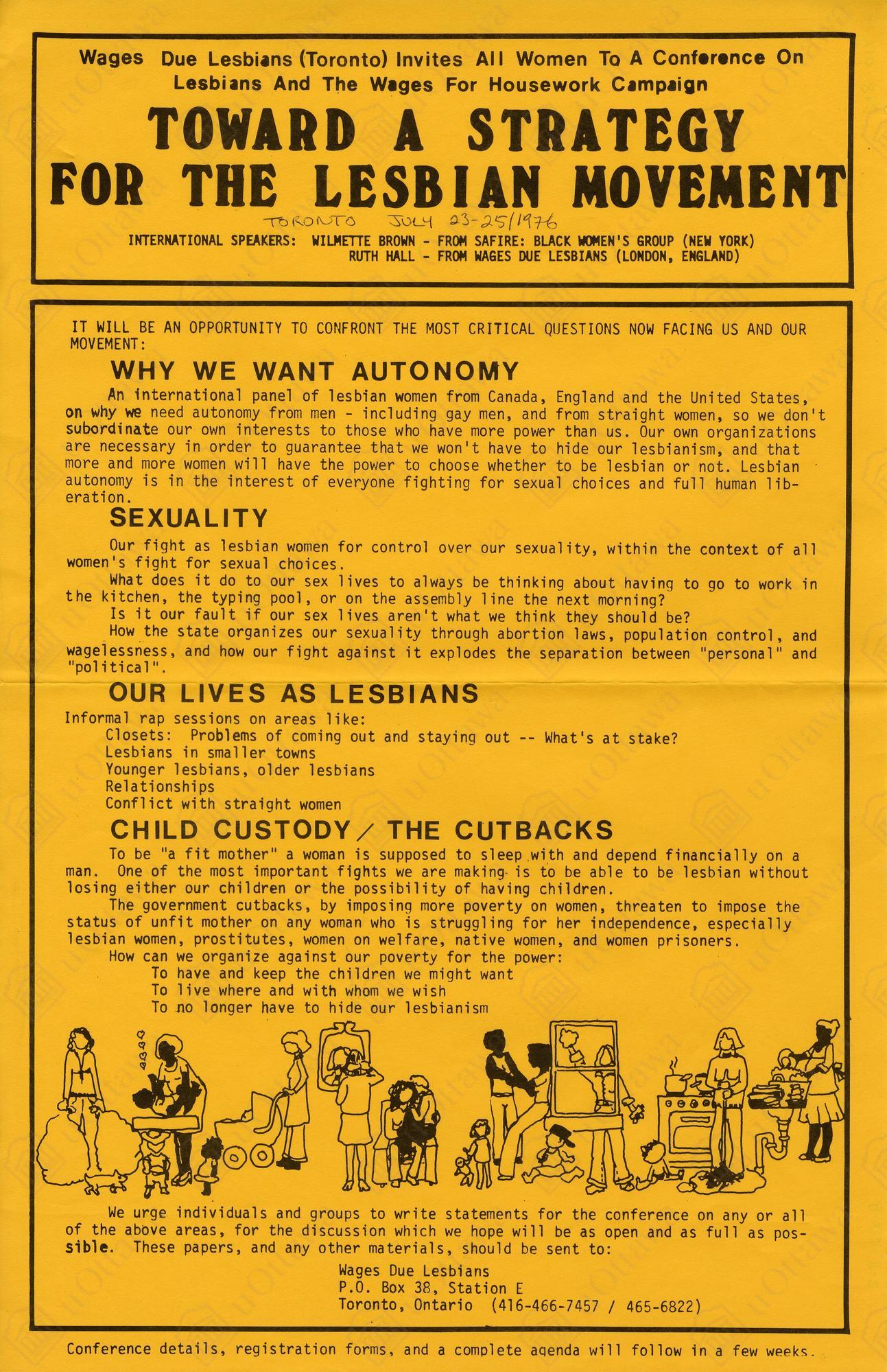
Title and statement of responsibility area
Title proper
Toward a Strategy for the Lesbian Movement poster
General material designation
- Graphic materials (electronic)
Parallel title
Other title information
Title statements of responsibility
Title notes
Level of description
Item
Reference code
CA ON0034 10-027-S1-I1
Edition area
Edition statement
Edition statement of responsibility
Class of material specific details area
Statement of scale (cartographic)
Statement of projection (cartographic)
Statement of coordinates (cartographic)
Statement of scale (architectural)
Issuing jurisdiction and denomination (philatelic)
Dates of creation area
Date(s)
-
July 23-25, 1976 (Creation)
- Creator
- Wages Due Lesbians
Physical description area
Physical description
1 poster
Publisher's series area
Title proper of publisher's series
Parallel titles of publisher's series
Other title information of publisher's series
Statement of responsibility relating to publisher's series
Numbering within publisher's series
Note on publisher's series
Archival description area
Name of creator
(1973-1984)
Administrative history
"Prior to Wages for Housework’s demise, in the mid-1970s a group of lesbians which had belonged to it created a new organization, Wages Due Lesbians (also known as Wages Due). Their policies were much the same, however, their emphasis was on the rights of lesbian mothers. Their constitutional difference was that: “Wages for Housework recognizes that doing cleaning, raising children, taking care of men, is not women’s biological destiny. Lesbianism recognizes that heterosexual love and marriage is not women’s biological destiny. Both are definitions of women’s roles by the state and for the advantage of the state.” (Lesbians Organize, Toronto, Ontario, 1977)
The Wages Due Lesbians organization campaigned to have housework recognized as work and demanded the right to have relationships with other women. They also made demands to the government for paid daycare, so that lesbian women could work and keep their children. As with Wages for Housework, they were highly involved in campaigns, rallies and publishing articles on women rights and in particular lesbian mothers’ rights. The organization seems to have disbanded by the early 1980s.
-
Avant la disparition de Wages for Housework, au milieu des années 70, un groupe de lesbiennes qui en faisait partie a créé une nouvelle organisation, Wages Due Lesbians (également connue sous le nom de Wages Due). Leurs politiques étaient sensiblement les mêmes, mais elles mettaient l'accent sur les droits des mères lesbiennes. Leur différence constitutionnelle est la suivante : ""Wages for Housework reconnaît que faire le ménage, élever les enfants, s'occuper des hommes, n'est pas le destin biologique des femmes. Le lesbianisme reconnaît que l'amour et le mariage hétérosexuels ne sont pas le destin biologique des femmes. Dans les deux cas, il s'agit d'une définition du rôle des femmes par l'État et à l'avantage de l'État"". (Lesbians Organize, Toronto, Ontario, 1977)
L'organisation Wages Due Lesbians a fait campagne pour que les tâches ménagères soient reconnues comme un travail et a revendiqué le droit d'avoir des relations avec d'autres femmes. Elle a également demandé au gouvernement de mettre en place des garderies payantes, afin que les lesbiennes puissent travailler et garder leurs enfants. Comme Wages for Housework, elles étaient très impliquées dans les campagnes, les rassemblements et la publication d'articles sur les droits des femmes et en particulier sur les droits des mères lesbiennes. L'organisation semble avoir été dissoute au début des années 1980."
The Wages Due Lesbians organization campaigned to have housework recognized as work and demanded the right to have relationships with other women. They also made demands to the government for paid daycare, so that lesbian women could work and keep their children. As with Wages for Housework, they were highly involved in campaigns, rallies and publishing articles on women rights and in particular lesbian mothers’ rights. The organization seems to have disbanded by the early 1980s.
-
Avant la disparition de Wages for Housework, au milieu des années 70, un groupe de lesbiennes qui en faisait partie a créé une nouvelle organisation, Wages Due Lesbians (également connue sous le nom de Wages Due). Leurs politiques étaient sensiblement les mêmes, mais elles mettaient l'accent sur les droits des mères lesbiennes. Leur différence constitutionnelle est la suivante : ""Wages for Housework reconnaît que faire le ménage, élever les enfants, s'occuper des hommes, n'est pas le destin biologique des femmes. Le lesbianisme reconnaît que l'amour et le mariage hétérosexuels ne sont pas le destin biologique des femmes. Dans les deux cas, il s'agit d'une définition du rôle des femmes par l'État et à l'avantage de l'État"". (Lesbians Organize, Toronto, Ontario, 1977)
L'organisation Wages Due Lesbians a fait campagne pour que les tâches ménagères soient reconnues comme un travail et a revendiqué le droit d'avoir des relations avec d'autres femmes. Elle a également demandé au gouvernement de mettre en place des garderies payantes, afin que les lesbiennes puissent travailler et garder leurs enfants. Comme Wages for Housework, elles étaient très impliquées dans les campagnes, les rassemblements et la publication d'articles sur les droits des femmes et en particulier sur les droits des mères lesbiennes. L'organisation semble avoir été dissoute au début des années 1980."
Custodial history
Scope and content
Wages Due Lesbians (Toronto) Invites All Women To A Conference On Lesbians And The Wages For Housework Campaign. Orange poster with black text, outlines issues for discussion at the conference "Why We Want Autonomy, Sexuality, Our Lives As Lesbians."
Notes area
Physical condition
45 x 28 cm
